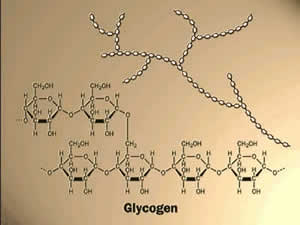Sports Science
Glycogen
Glycogen is an organic, heavily branched polymer found in animal cells. It is composed from between 600 and 1,200 glucose molecules joined end to end. Glycogen is the form in which glucose is stored in the body. It is stored in the liver and more importantly in the muscles of animals where it can be quickly converted to glucose and burnt in oxygen to provide energy.

How an endurance athlete performs during an event is directly related to the level of glycogen present in the muscle before exercise. The higher the levels of glycogen in the muscle the longer an athlete can continue to perform at their peak. This is why endurance athletes ensure they increase their glycogen levels before an event by proper diet. Carbohydrate loading is recommended for athletes that will perform for 2 hours or more. For events lasting less than 2 hours the amount of glycogen normally present in the muscle is sufficient and does not warrant carrying extra weight in the form of glycogen and its associated water. Every gram of glycogen is associated with, almost, 3 grams of water.
Glycogen stores are maximised by a consumption of carbohydrate of around 600 grams per day. Now this figure depends on many factors such as, body weight, type of sport, duration of training and other genetic factors. In order to use this amount of carbohydrate, in the synthesis of glycogen, muscle must be worked hard and long enough for glycogen depletion to occur. Otherwise the carbohydrates consumed find their way into fat storage rather than glycogen.
When the muscle is worked hard, so that glycogen depletion occurs, it responds by synthesising more glycogen than it started with. Muscles end up having a greater store of glycogen than they had before exercise. The replenishing of glycogen occurs rapidly in the first 2 hours after exercise and continues, to a lesser extent, for up to 24 hours. Replenishment of glycogen only occurs in the muscle groups that have been exercised and not in all muscles of the body. For example, a long distance runner who exercises on a bike may deplete and load the glycogen stores of muscles in his legs but not of those in his arms and upper body. So, during a marathon race, leg muscles will be loaded with glycogen but the rest of the body may fatigue due to a depletion of glycogen.
Lets take bodybuilding as an example of a sport that uses diet to achieve extreme results. Most importantly we will see how diet is used to influence the levels of glycogen in the body.
One week before a major event bodybuilders change the type of workout but continue to exercise hard and reduce, significantly, the amount of carbohydrate in their diet and instead increase the protein intake to provide the energy needed by the body. This depletes the body of glycogen and prevents the formation of any further glycogen by starving the synthesis process of its raw material, glucose. With a lack of glycogen, the body now cuts into the fat deposits and uses these reserves to provide energy for exercise.

Glycogen needs to break down very quickly to provide the muscle with glucose to burn during sudden intense exercise. Consider the glycogen molecule shown above. Describe why a branched structure will break down faster, to provide glucose, than a longer single chain of glucose molecules? Solution
About 75% of all glycogen is found in muscle. 50% of the body mass, on average, is muscle while 1% of the mass of a muscle cell is due to glycogen. Can you calculate the mass of glycogen in your body?
Stephen competed in an exhausting two hour road race. Two hours after the event he ate a hamburger meal and went to sleep. He competed the next day in a one hour event but complained of feeling exhausted and tired ten minutes into the start of the event. Give a possible explanation and suggest a suitable meal after the first exhausting event.